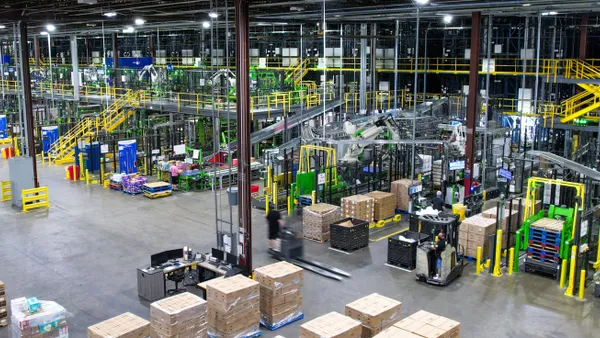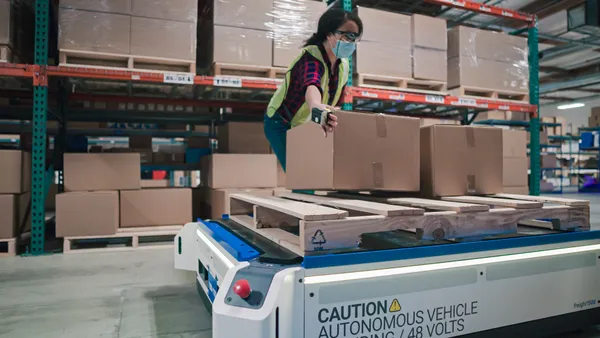Dive Brief:
- A majority (53%) of U.S. manufacturers expect to experience a change in operations as a result of the spreading COVID-19 outbreak, according to a survey of 558 respondents by The National Association of Manufacturers that took place between Feb. 28 and March 9.
- Operational changes include the implementation of business continuity plans involving workplace sanitation, limiting in-person interactions and managing shifts to account for an uptick in worker absences, the survey found.
- The survey found more than a third (36%) of respondents expected supply chain disruptions and some had resorted to looking for alternative suppliers. The survey did not say if the disruptions were the result of sourcing issues related to China.

Dive Insight:
Manufacturing across the board is expected to have moderate exposure to COVID-19 disruptions, but automotive manufacturing has a high level of exposure, according to a research note from Moody's emailed to Supply Chain Dive.
"Automotive Manufacturers are also highly exposed because of their reliance on international supply chains, many of which are being disrupted, as well as some direct exposure to China," Moody's wrote in its note. "We expect this to have a knock-on effect on automotive suppliers in many countries."
The United Auto Workers is asking some of the largest manufacturers in the U.S. — the big three automakers — to stop production for two weeks "to safeguard" members. But the companies have been unwilling to do so, according to a letter UAW President Rory Gamble sent to union members cited by CNBC.
COVID-19, an illness caused by a virus in the coronavirus family, has required nations across the world to consider quarantines or social distancing measures. It has resulted in factories stopping operations first in China and now across Europe. North American manufacturers say they're taking steps to continue production.
Some businesses have increased orders from suppliers as a safeguard against supply disruptions, according to The Wall Street Journal.
Boeing, which has had multiple employees test positive for COVID-19, has begun taking steps to change its operations, but it mostly involves more cleaning, according to the company.
"Production continues at this time, and the company has enhanced cleaning procedures in work spaces, common areas and on high-touch surfaces," Boeing said in a statement Monday. "We’re assessing the safety of all of our sites and their alignment with local, state and national government guidance as we continuously monitor this evolving situation."
How is your company changing operations to deal with COVID-19? Reach out here to let us know.
As of last week, C.H. Robinson said none of its major manufacturing customers had shut down operations in the U.S.
The biggest threat to supply chains will be the inability to access labor in the event of a mandatory quarantine, Suketu Gandhi, a partner at Kearney, told Supply Chain Dive in an interview. While automation is more present than ever in manufacturing, factories still rely on humans and can't function in a work from home situation, Gandhi said.
Consumer-facing and CPG manufacturers are dealing with a different issue related to the outbreak: a panic-induced demand spike. Companies that manufacture hand sanitizer or toilet paper are ramping up production as retailers see an uptick in out-of-stock items in certain categories.
"We are monitoring the situation closely to identify product availability issues and working with suppliers to make any adjustments as necessary," a spokesperson for P&G told Supply Chain Dive in an email. "We remain focused on making sure our products are available when and where people shop during this highly dynamic situation."
This story was first published in our weekly newsletter, Supply Chain Dive: Operations. Sign up here.














